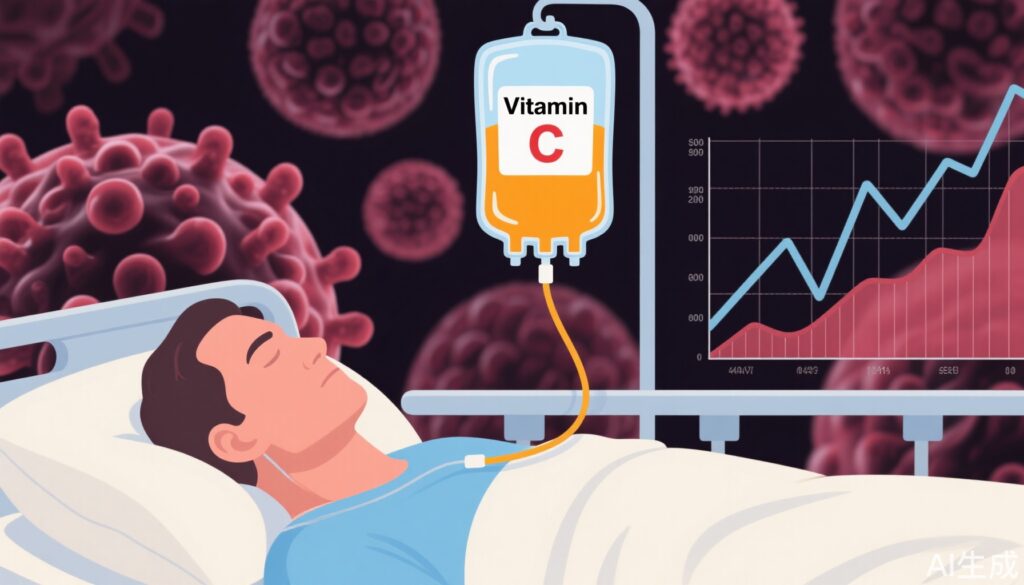Highlights
- Systematic review and meta-analysis of 2,722 adults with malignant neoplasms shows intravenous vitamin C significantly prolongs overall survival compared to controls.
- Pooled median survival ratio for overall survival was 1.83 (95% CI: 1.40-2.40), indicating a nearly doubled median survival time.
- Progression-free survival showed a favorable trend but did not reach statistical significance.
- Subgroup analyses suggest benefits are more pronounced with lower vitamin C doses and in certain regional and combination therapy contexts.
Study Background and Disease Burden
Malignant neoplasms (cancers) remain a leading cause of mortality worldwide, contributing to substantial morbidity and health system burden. Despite advances in surgery, radiotherapy, and systemic therapies, many patients face poor prognoses, particularly in advanced disease stages. There is ongoing interest in adjunctive treatments that may enhance survival or quality of life. Vitamin C, or ascorbic acid, has a controversial history in oncology, with preclinical studies suggesting anticancer effects, but clinical evidence has been mixed. Intravenous (IV) administration achieves much higher plasma concentrations than oral routes, potentially overcoming pharmacokinetic limitations. This systematic review and meta-analysis by Qu J et al. (2025) addresses the critical question: does IV vitamin C administration improve survival outcomes in adults with malignant neoplasms?
Study Design
The investigators conducted a comprehensive search of MEDLINE (via PubMed), Embase, and the Cochrane Central Register of Controlled Trials (CENTRAL) for randomized controlled trials (RCTs) and cohort studies evaluating IV vitamin C versus placebo or no treatment in adults with malignant neoplasms. The search covered all records up to October 13, 2024. Two independent reviewers performed data extraction and risk of bias assessment, applying the Grading of Recommendations Assessment, Development and Evaluation (GRADE) methodology to evaluate evidence certainty. The primary endpoint was overall survival (OS), with progression-free survival (PFS) as a secondary measure. The analysis used a frequentist statistical framework.
A total of 8 studies (RCTs and cohorts) with 2,722 adult participants met inclusion criteria. IV vitamin C dosing varied from 2.5 g/day to 1.5 g/kg/day, with treatment durations ranging from 9 days to 1 year. Control arms received either blank treatment or placebo.
Key Findings
Overall Survival (OS): The meta-analysis demonstrated a statistically significant association between IV vitamin C administration and increased median overall survival. The pooled median survival ratio was 1.83 (95% CI: 1.40-2.40; p < 0.001), indicating that, on average, patients receiving IV vitamin C lived approximately 83% longer than those in control arms. The certainty of this evidence was rated as moderate per GRADE criteria.
Progression-Free Survival (PFS): IV vitamin C was associated with a trend toward improved PFS (pooled median survival ratio: 1.80; 95% CI: 0.95-3.41; p = 0.073), though this did not reach conventional statistical significance. This suggests a possible benefit, but larger or more homogeneous studies are needed for confirmation.
Subgroup Analyses:
– Vitamin C doses less than 1 g/kg were associated with higher median survival ratios compared to higher doses.
– Non-Chinese studies (i.e., conducted outside of China) demonstrated greater benefit than those conducted in Chinese populations.
– The combination of IV vitamin C with non-chemotherapy regimens was associated with higher survival ratios compared to combinations with chemotherapy.
– Cohort studies reported larger survival benefits than RCTs, potentially reflecting patient selection or confounding factors.
Safety: The reviewed studies reported no unexpected adverse events directly attributable to IV vitamin C. Reported side effects were mild and included transient discomfort at the infusion site, mild gastrointestinal symptoms, and rare electrolyte disturbances.
Expert Commentary
While the results are promising, it is important to interpret them with caution. The moderate certainty rating reflects some limitations in the evidence base, including moderate heterogeneity among included studies, differences in dosing and combination therapies, and the predominance of cohort studies, which are more susceptible to bias than RCTs. The observed greater effect size in cohort studies may suggest residual confounding or selection bias. Additionally, the lack of a significant improvement in PFS despite a strong OS signal warrants further mechanistic investigation. Current clinical guidelines do not recommend IV vitamin C as a standard adjunct in cancer care, but these findings may prompt future guideline reevaluation, especially as additional RCTs emerge.
Mechanistically, IV vitamin C may exert selective cytotoxicity in cancer cells via pro-oxidant effects at high plasma concentrations, disrupt tumor microenvironmental factors, and potentially enhance host immunity or sensitivity to other treatments. However, further translational research is needed to elucidate these pathways and optimize patient selection.
Conclusion
This systematic review and meta-analysis provides moderate-certainty evidence that intravenous vitamin C can prolong overall survival in adults with malignant neoplasms. The findings support further clinical investigation and suggest that IV vitamin C could be considered as an adjunct in selected patients, pending validation in large-scale, high-quality RCTs. Future research should focus on optimal dosing, identifying responsive patient subgroups, and clarifying the mechanistic underpinnings of the observed survival benefit.
References
1. Qu J, Yao M, Yu S, Wang Y, Lu S, Wang B, He J, Wang S, Zhao Y, Wang X, Tao X, Liu X, Rao Y, Li Y, Rao B. Overall and Progression-Free Survival of Patients With Malignant Neoplasm Following Intravenous Vitamin C: A Systematic Review and Meta-Analysis. Int J Vitam Nutr Res. 2025 Jul 1;95(3):37372. doi: 10.31083/IJVNR37372. PMID: 40613397.
2. National Cancer Institute. Vitamin C (PDQ®)–Health Professional Version. https://www.cancer.gov/about-cancer/treatment/cam/hp/vitamin-c-pdq
3. Monti DA, Mitchell E, Bazzan AJ, et al. Phase I evaluation of intravenous ascorbic acid in combination with gemcitabine and erlotinib in patients with metastatic pancreatic cancer. PLoS One. 2012;7(1):e29794. doi:10.1371/journal.pone.0029794
4. Ma Y, Chapman J, Levine M, et al. High-dose parenteral ascorbate enhanced chemosensitivity of ovarian cancer and reduced toxicity of chemotherapy. Sci Transl Med. 2014;6(222):222ra18. doi:10.1126/scitranslmed.3007154



